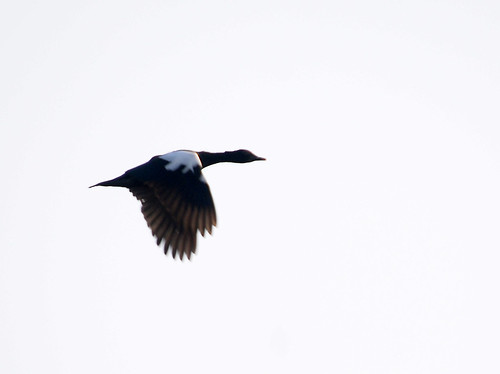One of the most intriguing sightings of the Venezuela trip was of this bird below. The shots in this post sum up the sighting perfectly. It flew past us along the river at frankly amazing speed and I gave it a little lead and burst off these shots. They're not too shabby so all those games of duck hunt on the NES as a child were obviously good for something.

The muscovy duck is a bird which intrigues me but if I'm honest I would never have recognised this bird as a muscovy. Wary and flying at speed it looks utterly different from the heavy-breasted slow waddling domestic varieties most of us have seen.

Domestic muscovies produce a heavier bodied, leaner carcass than domestic mallards with a stronger tasting meat. They are a highly valued food in Asia and I expect them to have a growing presence in western food as small farmers seek to develop niche products or diversify away from industrialised standard fare. They are also popular for smallholders as they don't quack in the way mallards do.

The origin of the name Muscovy is of some debate. It may be a corruption of Musky Duck or Musk Duck due to the strong taste of the meat or it may be that notwithstanding their American origin they were given an exotic, foreign name (in the same way Turkeys aren't from Turkey and Guinea Fowl aren't just from Equatorial Guinea). In fact they were also known as Barbary Duck in the past after another exotic place they don't inhabit. Unlike the mighty mallard, the wild muscovies are not sharing their domestic speciesmate's success - they are restricted to habitat and are a rather rare bird that it was fascinating to see in its most natural form.
3 comments:
Nice post about the Muscovy duck. The muscovy is not a native species in Maryland but I seen them in yards as pets.
People are always amazed when I mention that real muscovy ducks look quite different from what everyone sees as muscovies.
And I always thought the name was from the Muscovy Company (or Muscovite Company in some circles) that imported them all over the world many moons ago. I guess there's always more than one answer to a question...
Fascinating. I enjoyed your observation about the name and the fact that its meat may have had something to do with it.
I don't think we get the Muscovy here in the Indian subcontinent where I live. And I've generally been unlucky with ducks even in the winter when you do get migrants from northern climes.
I've had better luck with Himalayan birds, though, and you might like to drop by my blog to read my account of the Himalayan Monal or the Impeyan Pheasant as it is sometimes known.
Post a Comment